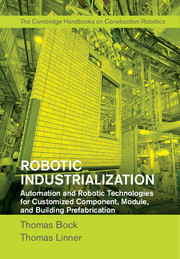 Robotic Industrialization
Robotic Industrialization Book contents
4 - Comparison of Large-Scale Building Manufacturing in Different Countries
Published online by Cambridge University Press: 05 August 2015
Summary
Chapters 4 and 5 deal with the off-site manufacturing of complete buildings composed of low-level components, medium-level components, and very high-level components (units) and focus in particular on systems and kits produced using automation and robot technology in larger quantities (large scale).
In this chapter, four countries are analysed: Germany, the United Kingdom, Spain, and China. The proportion of large-scale building system manufacturing within the building industry differs from one country to another, for various reasons. Technological background, existing inventory of buildings, or educational level may provide clues about how the building manufacturing industry has been developed. The degree of automation of manufacturing processes in each country also plays a strong role. What are the reasons of such a high level of automation in manufacturing processes? Each country has different possibilities and constraints to define policies and promote large-scale prefabrication (LSP). For instance, if a country must employ a low-wage workforce because of its socioeconomic background, this automated production model may not be the most suitable for its economy.
If we focus on technological background, Japan has a very long tradition in automated production processes. It is a step ahead of the rest of the countries regarding LSP. For this reason, Japan is considered separately in Chapter 5. LSP has also been quite developed in Germany, and accordingly, in Germany, many interesting companies prefabricate a considerable number of buildings per year, though in a less automated way when compared to Japan. In countries with less tradition in automated building manufacturing, such as Spain, the United Kingdom, or China, it is not so common to manufacture complete buildings in large quantities. Because of lower technological backgrounds in the building industry and the still very low wages in the conventional construction industry, traditional building processes cover a larger proportion. Even though countries such as Spain and China have experienced a large construction boom over the last decades, LSP has not been developed so deeply yet. However, in particular in China, the cooperation of Vanke and Broad holds strong potential for systematization, and perhaps later on, automation of the production of building systems. The Korean case is also promising in this regard. The technological background has been constantly developing and the long tradition in the highly automated shipbuilding industry offers new possibilities to perform LSP.
- Type
- Chapter
- Information
- Robotic IndustrializationAutomation and Robotic Technologies for Customized Component, Module, and Building Prefabrication, pp. 72 - 92Publisher: Cambridge University PressPrint publication year: 2015


